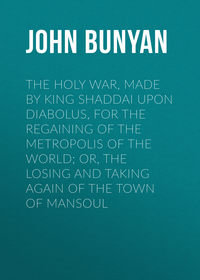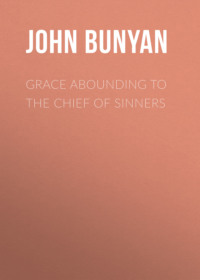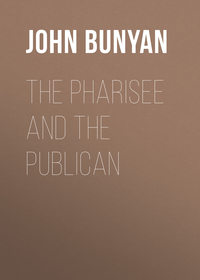
Полная версия
The Pilgrim’s Progress

THE PILGRIM’S PROGRESS
John Bunyan

Table of Contents
Title Page
History of Collins
Life & Times
Preface
Part I
Chapter 1
Chapter 2
Chapter 3
Chapter 4
Chapter 5
Chapter 6
Chapter 7
Chapter 8
Chapter 9
Chapter 10
Chapter 11
Conclusion
Part II
Chapter 1: Courteous Companions,—
Chapter 2: The Wicket-Gate
Chapter 3: The Interpreter’s House
Chapter 4: The Cross and the Consequences
Chapter 5: The Palace Beautiful
Chapter 6: The Valley of Humiliation
Chapter 7: Entertained by Gaius
Chapter 8: The Delectable Mountains and the Shepherds
Chapter 9: The Enchanted Ground
Chapter 10: The Pilgrims at Home
The Little Pilgrim: The Story of a Little Girl Who Tried to Go on Pilgrimage
Classic Literature: Words and Phrases adapted from the Collins English Dictionary
Copyright
About the Publisher
History of Collins
In 1819, millworker William Collins from Glasgow, Scotland, set up a company for printing and publishing pamphlets, sermons, hymn books and prayer books. That company was Collins and was to mark the birth of HarperCollins Publishers as we know it today. The long tradition of Collins dictionary publishing can be traced back to the first dictionary William published in 1824, Greek and English Lexicon. Indeed, from 1840 onwards, he began to produce illustrated dictionaries and even obtained a licence to print and publish the Bible.
Soon after, William published the first Collins novel, Ready Reckoner, however it was the time of the Long Depression, where harvests were poor, prices were high, potato crops had failed and violence was erupting in Europe. As a result, many factories across the country were forced to close down and William chose to retire in 1846, partly due to the hardships he was facing.
Aged 30, William’s son, William II took over the business. A keen humanitarian with a warm heart and a generous spirit, William II was truly ‘Victorian’ in his outlook. He introduced new, up-to-date steam presses and published affordable editions of Shakespeare’s works and The Pilgrim’s Progress, making them available to the masses for the first time. A new demand for educational books meant that success came with the publication of travel books, scientific books, encyclopaedias and dictionaries. This demand to be educated led to the later publication of atlases and Collins also held the monopoly on scripture writing at the time.
In the 1860s Collins began to expand and diversify and the idea of ‘books for the millions’ was developed. Affordable editions of classical literature were published and in 1903 Collins introduced 10 titles in their Collins Handy Illustrated Pocket Novels. These proved so popular that a few years later this had increased to an output of 50 volumes, selling nearly half a million in their year of publication. In the same year, The Everyman’s Library was also instituted, with the idea of publishing an affordable library of the most important classical works, biographies, religious and philosophical treatments, plays, poems, travel and adventure. This series eclipsed all competition at the time and the introduction of paperback books in the 1950s helped to open that market and marked a high point in the industry.
HarperCollins is and has always been a champion of the classics and the current Collins Classics series follows in this tradition – publishing classical literature that is affordable and available to all. Beautifully packaged, highly collectible and intended to be reread and enjoyed at every opportunity.
Life & Times
This is one of those works where it is essential to understand the historical context to gain insight into the author’s motivation. The Pilgrim’s Progress, by John Bunyan, was written in two parts – the first in 1678, the second in 1684. Bunyan was born in 1628, so he was already 50 years old when the first part was published. Those 50 years had seen a great deal of history played out in Britain, which goes a long way to explaining Bunyan’s intent.
He was born a couple of years into the reign of King Charles I, which proved to be the beginning of a period of great turmoil. Due to the King’s ill-judged actions, the English Civil War broke out in 1642 and would last until 1651, during which time hundreds of thousands died, either in the name of the monarchy or parliament. Charles was executed in 1649 and Oliver Cromwell took the role of Lord Protector from 1653 until his death in 1658. England then decided a monarchy was better than a republic and instated Charles II as the new king. The authorities even tried to erase the Protectorate from history by recording the start of Charles II’s reign from 1649. To this day, England is the only nation to have rid itself of monarchy and then brought it back again.
By the time Bunyan was 30 years old he had witnessed the horrors of warfare, which had only served to exchange the selfishness of Charles I for the piousness of Cromwell. He was now witnessing the frivolity and excesses of Charles II. Understandably, he felt that English society had become so confused that it was slipping into moral and ethical bankruptcy. People wanted to put the past behind them at the expense of their religious fortitude. They had the Christian Bible for guidance, but they appeared no longer to heed its message. Bunyan set about putting things right by means of an allegorical tale that would make the reader think about the consequences of their behaviour. It would be a kind of practical guide or companion to the Bible, so that the layperson had a straightforward point of reference, instead of having to read and interpret the metaphorical words of the good book. In effect, The Pilgrim’s Progress is a fable about what to expect in the afterlife if one chooses to act in one way or another during life.
Bunyan was a Protestant Christian. Following the restoration of the English monarchy, the nation became Anglican (Church of England) Christian under Charles II. Protestants had a puritanical approach to Christianity, while Anglicans were more progressive and open-minded. In 1664, the Conventicle Act was passed, which meant that it became illegal for anyone outside the Church of England to attend religious assemblies of more than five people. Bunyan found himself arrested for preaching and was subjected to two periods of imprisonment. It was his incarceration for his beliefs that inspired him to write The Pilgrim’s Progress, because it was a way of preaching his message regardless of his own circumstances. Once published, his words would be a meme in society. The authorities could imprison the man, but not his thoughts.
During this period in history people were generally obsessed with death. It was, after all, never far away due to warfare and disease, and Christianity had indoctrinated populations with the concept that their conduct in life would determine whether they went to heaven or hell. This pre-occupation with the afterlife pervaded all levels of society, so Bunyan’s writings had a potentially wide readership. Bunyan had been exposed to the uncertainty of life in 1644 when both his mother and sister died. Shortly after this he had signed up with the parliamentary army, otherwise known as the Roundheads.
In his early twenties Bunyan began to reflect on his misspent youth and claimed that he had a calling to Christianity. He struggled for a number of years to come to terms with reforming his own character, but eventually emerged with a clear understanding of his mission. It was the acknowledgement of his own lack of moral fibre in youth that prompted him to guide others in their own journey to redemption. He was a converted sinner surrounded by scores of other sinners, all wishing to be led to salvation.
Monotheism – the idea that a single god is responsible for everything – was a ubiquitous mindset in the Western world in Bunyan’s time. No one questioned that accepted wisdom, largely because science was still in its infancy, so religions provided rounded explanations for the workings of the world. It would be some time before science demonstrated empirical explanations for phenomena previously attributed to the actions of an omnipotent entity.
The Pilgrim’s Progress describes the quasi-literal spiritual journey of the central character, Christian, who meets various other characters and visits many places along the way. These characters and places represent good and bad qualities and concepts. Christian has to negotiate his way through a supernatural parallel world, from his hometown, The City of Destruction (Earth), to his intended destination, The Celestial City (Heaven). The second part of the book relates the same journey taken by his family.
The book thus falls into the genre of fantasy, albeit with a religious message. Bunyan used the word ‘dream’ to describe its manner of delivery. He clearly reasoned that it needed to be a good read first and foremost, to keep the reader engaged throughout. That way, the allegory would be effortlessly absorbed, making it far more accessible than the Bible. Of course, it also suited the tradition of public storytelling. As relatively few people were able to read, they would rely on an educated individual to entertain them with an interesting yarn. In that respect a journey is a useful device, as it allows the central characters to travel through different experiences and circumstances. In other words, there is a plot, which makes the reader or listener want to know what will happen next – the staple of all good stories.
It just so happened that the Popish Plot coincided with publication in England. It was alleged that the Catholic Church was infiltrating England and conspiring to assassinate Charles II. Bunyan’s work fuelled the fire of anti-Catholic sentiment in England, a sentiment which lived on into the 20th century in some regions. When King James II took the throne in 1685 he introduced a policy of religious tolerance, because he had Catholic beliefs. He was widely detested by Protestants and this led to the Glorious Revolution in 1688, when James was overthrown by William III, who had come from Holland to restore the Protestant regime.
Catholicism fell from favour because it was seen as too extravagant to be godly. The term ‘catholic’ is used as a synonym for gaudy tastes, because Catholic churches were so adorned with colourful decoration that they were seen to detract from true faith. Protestantism, in contrast, was all about getting back to basics. Its churches were plain and simple, so that attention was centred on devotion and worship. Corruption was also rife in the Catholic Church, because priests were allowed to accept payments and gifts for their work as conduits to the Christian God. Protestant priests, on the other hand, were nourished by their devotion and made far more modest demands of their congregations.
Three years after the publication of the first part of The Pilgrim’s Progress in England, it was published in America, where it enjoyed success among Protestant communities. Life in America was hard-going as it was still very much in its embryonic stages of development. Bunyan’s work was viewed as a useful guide in an environment where hardships often led people to think selfishly and intolerantly.
Bunyan died as unpredictably as one could expect in his day. He developed a cold while riding to London. Within hours he was delirious with fever and died soon after of pneumonia. His death served to illustrate the importance of keeping up one’s pursuit of godliness at all times, so as to be certain – even at very short notice – of favourable treatment in the afterlife.
PREFACE
It may seem a very bold undertaking to change even a word of the book which, next to the Bible, has been read by more people, old and young, than any other book in the English language.
But, it must be remembered that, although The Pilgrim’s Progress has come to be a children’s book, and is read more often by young people than by those who are older, it was not the purpose of John Bunyan to write a book for children or even for the young.
The Pilgrim’s Progress was a book for men and women; and it was aimed to teach the great truths of the gospel. Hence while most of it is written in a simple style,—as all books should be written,—it contains much that a child cannot understand; not often in the story, but in the conversations and discussions between the different persons. Some of these conversations are in reality short sermons on doctrines and teachings which Bunyan believed to be of great importance. But these are beyond the minds of children and give them great trouble when the book is read. They do not like to have them left out of the reading, thinking that they may lose something interesting. Many a young person has stumbled through the dull, doctrinal parts of the book, without understanding them; and even grown people find them in our time somewhat of a blemish upon the wonderful story, valuable as they were supposed to be in Bunyan’s own time.
For many years it has been in my mind, not to re-write The Pilgrim’s Progress, for that would destroy its greatest charm, but to change the words here and there to simpler ones, and to omit all the conversations and arguments concerning subjects belonging to the field of doctrine; in other words to place the story of The Pilgrim’s Progress in such a form that every child ten years old can understand it. My purpose is to make it plain and interesting to children, leaving the older form of the book to be read by them when they become older.
Perhaps a short account of Bunyan’s own life may add to the interest of his book. John Bunyan was born in 1628 at Elstow, a small village near Bedford, which is in the heart of England. His father was a poor man, traveling on foot from place to place mending pots and pans and the simple furniture of country kitchens, and the son followed the same trade, and was known as a “tinker.” He tells us that he lived a wild life, and was especially known as one of the worst swearers in the region.
When the great Civil War broke out in England, in 1642, between King Charles the First and the Parliament, Bunyan became a soldier on the side of the Commonwealth, as the party against the king was called. He served in the army between 1644 and 1646.
In 1648, at the age of twenty years, he married a good young woman, who led him to prayer and to a new life. But it was hard for one who had led such a life as his had been to turn to God, and it cost the young man a great struggle. It seemed to him that his past sins were like a load upon his back, just as he afterward wrote of his “pilgrim,” and it was long before he found peace.
He became a member of a little Baptist society, and soon began to preach. Crowds came to hear him, drawn by his earnest spirit and his quaint striking manner. But when Charles the Second became king, no religious services were allowed except those of the Church of England, and all other meetings were forbidden. Bunyan however went on preaching, until he was sent to prison in Bedford. In Bedford jail he stayed twelve years. To find a means of living in jail, he made lace, and sold it as a support for himself and his blind daughter.
If the prison was hard for Bunyan his sufferings were made a blessing to untold millions, for while in Bedford jail he wrote The Pilgrim’s Progress. This story was intended to be a parable, like many of our Saviour’s teachings; that is, it put into the form of a story the life of one who turns from sin, finds salvation through Christ, and in the face of many difficulties makes his way through this world to heaven. Even a child who reads or listens to the book will see this meaning in part; and he will understand it better as he grows older.
In 1672 Bunyan was set free, and allowed to begin again his work as a Baptist minister, and he soon became one of the most popular preachers in all England. He died quite suddenly in 1688, when he was sixty years old, and is buried in an old graveyard now near the center of London, called Bunhill Fields Burial-ground. In the same ground is buried another great writer, Daniel Defoe, whose story of “Robinson Crusoe” ranks next to The Pilgrim’s Progress in the number of its readers; also Isaac Watts, the author of many hymns sung in all the churches, and Mrs. Susanna Wesley, the mother of the great John Wesley. Four people who have left a deep mark upon the world, all lie near together in this small cemetery in London.
Every child should read The Pilgrim’s Progress as a story if no more than a story; should read it until he knows it by heart. And the older he grows the deeper will be the meaning that he will see in it.
JESSE LYMAN HURLBUT.
CHAPTER 1
As I walked through the wilderness of this world, I lighted on a certain place where was a den, and laid me down in that place to sleep; and as I slept, I dreamed a dream. I dreamed, and behold, I saw a man clothed with rags, standing in a certain place, with his face from his own house, a book in his hand, and a great burden upon his back. I looked, and saw him open the book, and read therein; and as he read, he wept and trembled; and, not being able longer to contain, he brake out with a lamentable cry, saying, “What shall I do?”
In this plight, therefore, he went home, and restrained himself as long as he could, that his wife and children should not perceive his distress; but he could not be silent long, because that his trouble increased. Wherefore at length he brake his mind to his wife and children; and thus he began to talk to them: “Oh my dear wife,” said he, “and you my sweet children, I, your dear friend, am in myself undone by reason of a burden that lieth hard upon me; moreover, I am told to a certainty that this our city will be burned with fire from heaven; in which fearful overthrow, both myself, with thee, my wife, and you, my sweet babes, shall miserably come to ruin, except some way of escape can be found whereby we may be delivered.” At this all his family were sore amazed; not for that they believed that what he had said to them was true, but because they thought that some frenzy or madness had got into his head; therefore, it drawing towards night, and they hoping that sleep might settle his brain, with all haste they got him to bed. But the night was as troublesome to him as the day; wherefore, instead of sleeping, he spent it in sighs and tears. So when the morning was come, they would know how he did. He told them, Worse and worse: he also set to talking to them again; but they began to be hardened. They also thought to drive away his madness by harsh and surly treatment of him: sometimes they would ridicule, sometimes they would chide, and sometimes they would quite neglect him. Wherefore he began to retire himself to his chamber, to pray for and pity them, and also to sorrow over his own misery; he would also walk solitary in the fields, sometimes reading, and sometimes praying; and thus for some days he spent his time.
CHRISTIAN’S DISTRESS OF MIND
Now, I saw, upon a time, when he was walking in the fields, that he was (as he was wont) reading in his book, and greatly distressed in his mind; and as he read, he burst out as he had done before, crying, “What shall I do to be saved?”
I saw also that he looked this way and that way, as if he would run; yet he stood still, because (as I perceived) he could not tell which way to go. I looked then, and saw a man named Evangelist coming to him, who asked, “Wherefore dost thou cry?”
He answered, “Sir, I read in the book in my hand, that I am condemned to die, and after that to come to judgment; and I find that I am not willing to do the first, nor able to do the second.”
Then said Evangelist, “Why not willing to die, since this life is troubled with so many evils?” The man answered, “Because I fear that this burden that is upon my back will sink me lower than the grave, and I shall fall into Tophet. And, sir, if I be not fit to go to prison, I am not fit to go to judgment, and from thence to death; and the thoughts of these things make me cry.”
Then said Evangelist, “If this be thy condition, why standest thou still?”
He answered, “Because I know not whither to go.” Then he gave him a parchment roll, and there was written within, “Flee from the wrath to come.”
The man, therefore, read it, and looking upon Evangelist very carefully, said, “Whither must I fly?” Then said Evangelist (pointing with his finger over a very wide field), “Do you see yonder wicket-gate?” The man said, “No.” Then said the other, “Do you see yonder shining light?” He said, “I think I do.” Then said Evangelist, “Keep that light in your eye, and go up directly thereto; so shalt thou see the gate; at which, when thou knockest, it shall be told thee what thou shalt do.” So I saw in my dream that the man began to run. Now, he had not run far from his own door, when his wife and children perceiving it, began to cry after him to return; but the man put his fingers in his ears, and ran on, crying, “Life! life! eternal life!” So he looked not behind him, but fled towards the middle of the plain.
CHRISTIAN FLEES FROM THE CITY
The neighbors also came out to see him run; and as he ran, some mocked, others threatened, and some cried after him to return; and among those that did so there were two that resolved to fetch him back by force. The name of the one was Obstinate, and the name of the other Pliable. Now, by this time the man was got a good distance from them; but, however, they were resolved to pursue him, which they did, and in a little time they overtook him. Then said the man, “Neighbors, wherefore are ye come?” They said, “To persuade you to go back with us.” But he said, “That can by no means be: you dwell,” said he, “in the City of Destruction, the place also where I was born: I see it to be so; and, dying there, sooner or later, you will sink lower than the grave, into a place that burns with fire and brimstone. Be content, good neighbors, and go along with me.”
OBST. “What!” said Obstinate, “and leave our friends and comforts behind us?”
CHRIS. “Yes,” said Christian (for that was his name), “because that all which you forsake is not worthy to be compared with a little of that I am seeking to enjoy; and if you would go along with me, and hold it, you shall fare as I myself; for there, where I go, is enough and to spare. Come away, and prove my words.”
OBST. What are the things you seek, since you leave all the world to find them?
CHRIS. I seek a place that can never be destroyed, one that is pure, and that fadeth not away, and it is laid up in heaven, and safe there, to be given, at the time appointed, to them that seek it with all their heart. Read it so, if you will, in my book.
OBST. “Tush!” said Obstinate, “away with your book; will you go back with us or no?”
CHRIS. “No, not I,” said the other, “because I have put my hand to the plough.”











